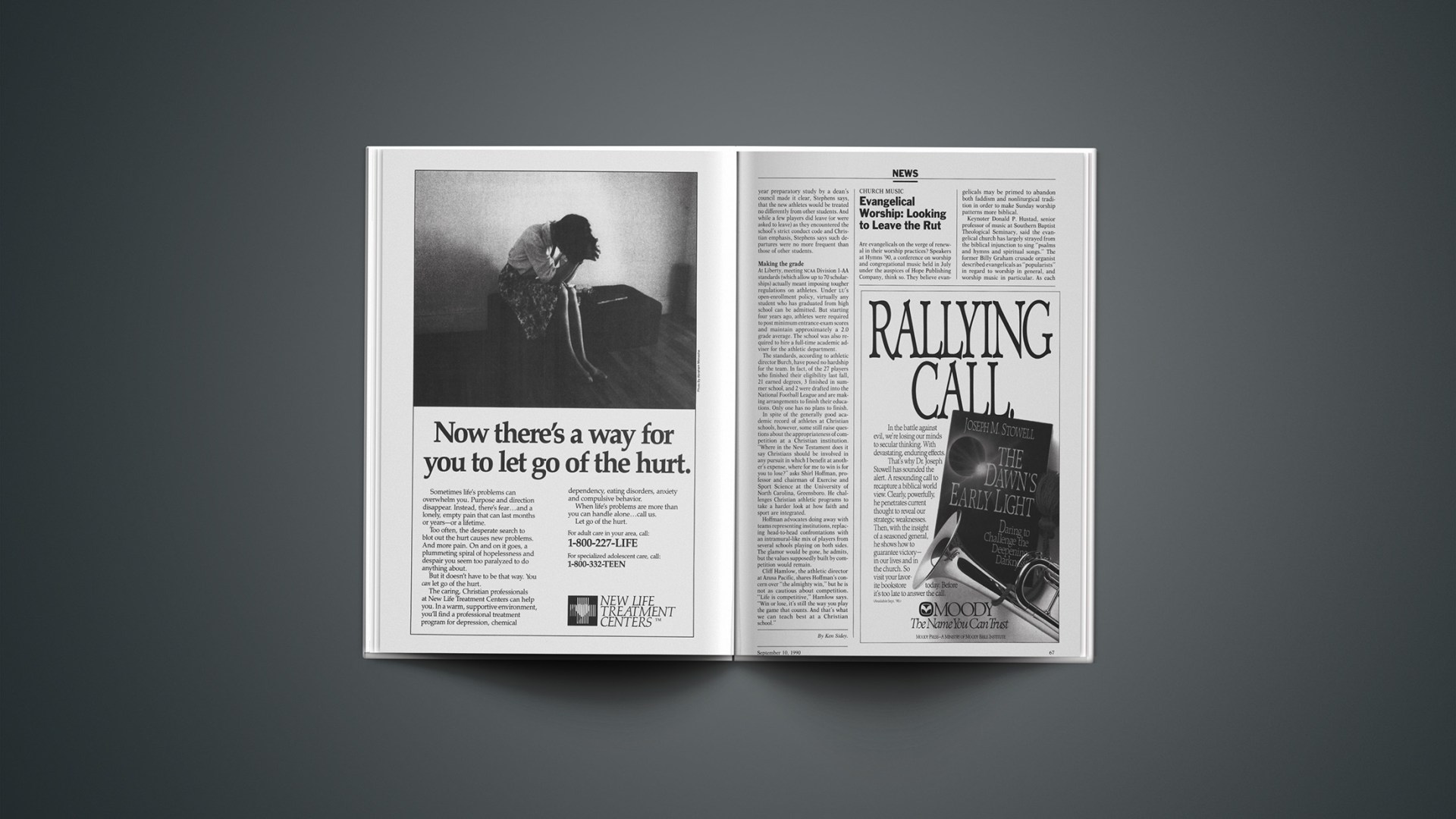Are evangelicals on the verge of renewal in their worship practices? Speakers at Hymns ’90, a conference on worship and congregational music held in July under the auspices of Hope Publishing Company, think so. They believe evangelicals may be primed to abandon both faddism and nonliturgical tradition in order to make Sunday worship patterns more biblical.
Keynoter Donald P. Hustad, senior professor of music at Southern Baptist Theological Seminary, said the evangelical church has largely strayed from the biblical injunction to sing “psalms and hymns and spiritual songs.” The former Billy Graham crusade organist described evangelicals as “popularists” in regard to worship in general, and worship music in particular. As each new fad has come along, Hustad explained, evangelicals have been caught up in it, often discarding everything that has gone before. Yesterday’s emphasis on singing only revivalistic gospel songs, he said, has become today’s preoccupation with praise choruses.
By contrast, said Hustad, liturgical churches have done better in preserving classical worship traditions, while evangelicals have rarely understood the real essence of worship and have thus been cheated of their heritage. In an interview, Hustad ventured the opinion that some evangelicals who have grown weary of corporate worship they view as trite have abandoned the churches of their childhood for those they perceive to be richer in celebration of the majesty of God—Anglicanism or Orthodoxy, for example. Some other church musicians say they fear the paucity of the worship experience has driven still others away from the established church entirely.
But all that may be changing. In plenary sessions and evening worship celebrations at Hymns ’90, ministers of music, as well as several pastors, heard challenges aimed at renewal in worship. They participated in sessions devoted to singing much of the hymnody contained in Hope’s new hymnal, The Worshiping Church.
The new compilation, six years in the making, was released just over 15 years after the 1974 publication of its predecessor, Hymns for the Living Church. (At one time, the life expectancy of a hymnal was 20 or more years; but Hymns appeared 17 years following the widely used Worship and Service Hymnal [1957], and now, according to Hope’s president, George Shorney, the period between hymnal editions appears to be shortening to as little as 10 years.) The conference at Wheaton College’s Graham Center was to some extent a vehicle for introducing the new hymnal to church musicians and worship leaders.
Other conference speakers echoed Hustad’s keynote theme, one that underlies the philosophy of the 845-selection book: a call for the singing church to rediscover psalm singing, restore the use of ancient hymns, and learn some of the hundreds of vibrant new hymns written in the past 20 years.
Dean of the Wheaton College Conservatory of Music Harold Best told conferees that evangelicalism shares America’s fascination for the “popular” in that popular has come to mean “familiar, and familiar has come to mean worthwhile, whatever the idiom.… Almost everything subsists on the principle of easy entry, easy experience with, and easy exit from, any number of experiences.” Best said that much of what is done in worship is based in familiarism and continual return to practices “from which we should be taking creative leave.” Furthermore, if evangelicals could learn one thing from true liturgical worship, he said, it is that “a true liturgy hides individuals.”
Many attending the conference admitted it will be difficult to wean local congregations from familiar patterns of worship. Persuading them to embark instead on a worship experience that will be more holistic—centered more in personal and corporate expression than on platform-led performance—presents a challenge to church musicians and clergy alike.
For its part, Hope Publishing is gambling that the The Worshiping Church will be embraced by many congregations that are looking for renewal in worship.
By Carol R. Thiessen.










